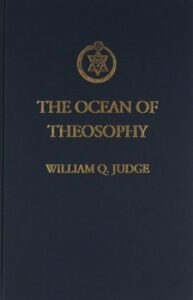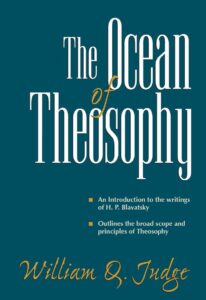Studies In The Ocean of Theosophy Part XXVI
Theosophy Magazine
Vol. 23, No. 2 December 1934
pages 83 - 86
Part XXVI
CONSIDERATION of the subject of death naturally raises the question as to communication if possible with those left behind. Theosophy answers that, although not actually beholding our dear ones, “we make to ourselves their images as full, complete and objective as in life, and devoid of all that we then thought was a blemish.” In illustration is cited the case of the deceased mother of a drunken son enjoying his companionship as “a sober, good man”. And such fulfillment of the heart’s desire in Devachan holds good “likewise through all possible cases.”
The dead suffer no bereavement; and for the sorrow of the living Nature has much to offer as an anodyne, were her constitution and laws apprehended. For “entities in devachan are not wholly devoid of power to help those left on earth. Love, the master of life, if real, pure, and deep, will sometimes cause the happy Ego in devachan to affect those left on earth for their good, not only in the moral field but also in that of material circumstances.” Furthermore, there is consolation in the teaching that while the body sleeps, the Soul may ascend to the devachanee, merge into his consciousness, feel and think with him, then bring this experience back to waking as a vivid dream or sense of nearness. In this, the dead are usually portrayed as the visitants; but the opposite is the case. Re-embodiment is one path of return.
The evanescence of objective existence and the inevitability of death seem to have little effect upon Man’s tendency to identify himself with the physical. To the extent that this is done, heart-to-heart communion is by so much precluded. So, after all, this leaves much to be desired for human association here on earth in general; and it is possible for mutual understanding to be so modified, even among those of closest ties and deepest affection, that real communication is only approximate. Perhaps only in rare moments may the love and devotion felt find adequate expression.
Yet, however imperfect, who would not cling to these fond associations and find desolation in their loss! Theosophy regards not lightly, but with reverence, the solemn event of death; nor does it minimize the devastating agony that sweeps over the bereaved. There is no cry of pain to which the Great Teachers are indifferent. Having fathomed the human heart, They both sympathize and heal. No rebuke is directed towards longing for the warm, living touch of those snatched away by death, but there is rebuke directed against illegitimate attempts to reach the beloved dead — those foolish, vain efforts to set aside the natural order of things. Topically considered, it is surprising what a mighty block of warning is scattered through the pages of the “Ocean” regarding the imminent dangers attending efforts to interview the dead. This particular chapter stresses the impossibility of success, stating unequivocally: “We cannot reach them nor affect them unless we are Adepts. The claim of mediums to hold communion with the spirits of the dead is baseless, and still less valid is the claim of ability to help those who have gone to devachan." Soul communion will never be found in the seance room nor by any mediumistic practice. All that can be gained from these is contact with discarded garments, left to disintegrate on the astral plane — dead men, indeed, with influence so contaminating as to prevent genuine spiritual communion through the avenues of sleep. But he who bows to Nature’s edicts shall reap her solace; and if philosophical understanding be added, the remaining years on earth will be blessed with assurance of re-union in future incarnations.
One single exception is made to the futility of alleged psychical communications with dwellers in the mansions of Soul. And this exception would seem to be involuntary action, rather than an attempt to reach the spiritual realms. Sometimes, “the hypersensitive and pure medium goes into this state and then holds communication with the Egos there, but it is rare, and certainly will not take place with the general run of mediums who trade for money. And the gulf between the consciousness of devachan and that of earth is so deep and wide that it is but seldom the medium can remember upon returning to recollection here what or whom it met or saw or heard in devachan."
The very vesture in which the man in Devachan functions secures a subjectivity too profound to permit response to the clamorings of the physical world. Unbreakable barriers guard the sanctuary of the disembodied Ego, wherein he exercises his spiritual rights of creative thought. How could beings clothed in gross matter and motivated by selfishness gain access to souls arrayed in substance attenuated beyond human conception and responsive to only the loftiest stirrings of the higher nature!
If the charge of selfishness seems unjust, let the would-be communicant ask himself who is the supposed beneficiary. Could it be partakers of celestial ecstasies, conceded to lack naught? If not, why should begrimed earth dwellers, unsuitably robed and far from blissful, proceed to mar the exquisiteness of the fair “summer land”! Why inject discord into Heaven, when all benefits would accrue to the living, themselves due to touch the other shore, ere long? Such impatience seems out of keeping with candidates for Paradise and little betokening the Christian grace of submission to God, who in his wisdom, has ordained a temporary separation!
Even in case of close, interior connection, the analysis of attempted inter-communication between the embodied and the discarnate discloses unsound thought and feeling; but wholesale efforts to break into the spiritual realm or to drag its inhabitants from their abiding place, to float around seance cabinets, is superlatively intrusive. Imagine the complications and possible heartaches, were the claims of Spiritualism bona fide! An exaggeration of all the hazards of social life would prevail, both here and yonder. The hosts of Heaven would be in worse case than the house-mothers of pioneer days, always subject to wagon-loads of unexpected company; for the latter had, at least, made previous acquaintance with their guests; while the former could be unceremoniously pounced upon by anyone. Then, too, should dear ones on earth forget the departed and fill up their places with others, there would be nothing to veil the fact. Were avenues of free intercourse established between the physical and the metaphysical spheres, ghosts could walk here at inopportune times and where least welcome; and the peace of Devachan would be disrupted by many distasteful interviews.
Kind Nature forbids commingling of this workaday world with the after-death state of bliss and rest. There are no uncongenialities for the devachanee, nor any embarrassing situations. All that was formerly disliked is now non-existent. The personnel and character of all contacts are just what preference calls for, the mind drifting according to fancies, with the ebb and flow of happy feelings. Should the momentary object of devotion be enjoying more agreeable companionship, no slight is suffered thereby. Neither does the envisaging of the dead interfere with the living. And, just as truly, no yearning of the living can break in upon the meditations of Devachan.
The true doctrine thus reveals the utter impossibility of crashing the gates of higher realms, invisible and inviolable; as well it reveals many ludicrous angles in the claims of seer and necromancer. Not the least is the probability, in some instances of alleged communication with the dead, that the “departed” have already returned. This, of course, could happen in the case of a child less than seven years of age at demise, but could also occur with an adult of materialistic leanings. For it is stated that a “materialistic thinker may emerge out of devachan into another body here in a month, allowing for the unexpended psychic forces originated in early life”; and still more unreachable would be the desperately materialistic thinkers, who “remain in the devachanic condition stupefied or asleep, as it were”, and for whom “it can be very truly said that there is no state after death so far as mind is concerned; they are torpid for awhile, and then they live again on earth.”
We may, perhaps, resent any intimation of materialism on the part of our beloved; but what are our standards for judgment? Schooling, culture, accomplishment, social graces, personal winsomeness, tasteful apparel — none of these, nor many other things highly prized in the world, are criteria. The Teachers say that even a soulless being may possess all of them. Materialism is the focusing of the mind no higher than the purely intellectual plane of thought.
Evidently, Duty is the “royal talisman” even for alleviation of the sorrow of bereavement. Intelligent, unselfish service for Humanity is the great panacea, consisting of the cheerful performance of the tasks presented by Karma. Faithful fulfillment of duty must needs lead to the fulfillment of every just desire. Karma and Reincarnation are the lost chords of the Music of Life; their lack introducing discord into all its movements. Karma shows the justice and, therefore, the hidden beneficence of all necessary separations by death; Reincarnation assures of reunion and compensation for the temporary loss.
The less time spent in devachanic dreaming, the sooner will those cherished meetings, here, take place. The more men strive to live as souls, the less can flesh veil their hearts from each other, and the greater the satisfaction found in their associations. The loftiest imaginings of Devachan reveal their selfishness and lack compared with the ideal of Man’s true destiny and the marvellous processes involved in its consummation. These processes include every variety of human association — best of all loving comradeship in which fellow travellers journey, not selfishly, but the while reinforcing each other’s efforts to uplift and further the evolution of the Human Race.
Back to The Ocean of Theosophy



